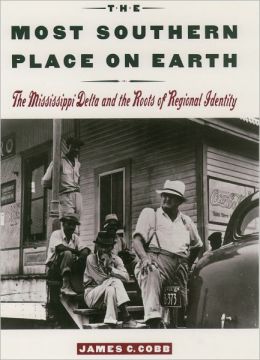One wonders how this location will work out. There was a great deal of controversy this year, we learned, about holding the conference in New Orleans, as New Orleans is not part of Caribbean geography, as anyone who has looked at a map knows. This latter has been, of course, an argument we have been making for over 20 years now. Though, as our plenary pointed out, "Caribbean" is a terrific brand. As el V put it, 'Nobody was going to spend millions of dollars to create a movie franchise called Pirates of the Gulf of Mexico." (Just like Cuba, Havana and New Orleans are all also excellent brands.)
Being so occupied, the only book I read in, the reading limited to the flights to and from NO, and in Breaux Bridge for an hour before bed, when the internet got knocked out from a lightning strike, was The Most Southern Place on Earth: The Mississippi Delta and the Roots of Regional Identity (1992; Oxford University Press) by James C. Cobb. This is one of the seminal works that explains the contemporary south by viewing the economic and cultural history of this place, a rough triangle between the lower Mississippi River and the Yazoo River.
 |
| The green is the Mississippi Delta. |
It is not the Mississippi River delta -- which tends to confuse those unfamiliar with deep south geography. the Mississippi River delta is way down further south. "Delta" here means this particular locale within the state of Mississippi. Or, as author/ historian David Cohn wrote in 1935:
 |
| Peabody Hotel 1886 |
This region is peculiar even within the milieu of the rest of the deep south, and even the state of Mississippi itself. This was a re-read; the first reading was before the March 2014 sojourn there. It was valuable for that sojourn to have read it before spending boots on the ground time there, but even more valuable to read again after having done so. All the markers that Cobb hits in The Most Southern Place on Earth are still present to be read, in the other deep south states, like Alabama and places in Mississippi, as Biloxi.
"The Mississippi Delta begins in the lobby of the [Memphis] Peabody Hotel and ends on Catfish Row in Vicksburg. The Peabody is the Paris Ritz, the Cairo Shepherd's, the London Savoy of this section. If you stand near its fountain in the middle of the lobby... ultimately you will see everybody who is anybody in the Delta..."
Africatown in Pritchard (where settled the descendants of the last slave ship, the Clotilda, from Africa to land on U.S. shores in 1860, brought as deliberate provocation to war, settled after the Civil War) outside of Mobile, remains as shocking in its tumbledown, malnourished poverty in May, 2015 as it was in May, 1910 or 1930 or 1940.
Katrina made all of it worse, as it's obvious no FEMA monies got trickled down to any of these Africatowns in the deep south, though of course the fracking so-called presidential library of Jefferson Davis got 10 million federal FEMA dollars and the mansion which a wealthy widow gave him, Beauvoir, received 4 million FEMA dollars for repairs after Katrina. But the homes of the poor black citizens of Mississippi and Alabama -- nada. You can see this, with your own eyes. They can't even hide it. But nor do they care obviously, as the stars and bars flies over all the Welcome to Mississippi rest stops . . . .
Among the elements that Cobb works in so cogently within his main threads of white supremacy, labor economics and political dominance of the ruling Delta planter aristocracy is the development of the Blues -- why the development of the Blues, and their significance, in this particular region. He provides maps that coordinate the birth places and earlier years of a legion of legendary Blues
musicians, which run up and down the Mississippi and cluster with the density of cotton bolls in the Delta. One chapter devoted particularly to the Blues is titled, "The Blues Is A Lowdown Shakin' Chill," one of the Blues classics particularly
attributed to the legendary Robert Johnson. I had skipped ahead to that chapter on this re-read, in the hour before meeting up with friends and dinner, and then going out to hear contemporary Blues-man, Brother Tyrone at the Ooh Poo Pah Doo Bar, which is named after the 1960 hit by the owner's father, the late R&B legend Jessie Hill.
As was often the case with American assistance to other nations, in the Delta aid offered in the name of economic rehabilitation and human uplift was routed, in the interest of political expediency and stability, through those at the top of the region's socioeconomic structure. As a result, the story of the interaction of agricultural, civil rights, and social welfare policy in the Mississippi Delta is especially instructive. Regardless of region, nation, or hemisphere, when economic reform proceeds under safeguards against redistribution of wealth or power, social and political rights will prove difficult to extend and dangerous to exercise. Meanwhile, whether its story is told in the smudged ledgers of the landlord or the antiseptic memoranda of the bureaucrat, the phenomenon of economic and sociopolitical dependence is likely to remain as real and debilitating as ever.The lesson is that neither assistance nor reform can happen from "inside" or from the top down via the ruling establishment.
Frequently Cobb draws understanding from the Delta's white supremacy wealth and power's support by the federal government, used by it to maintain black labor poverty and powerlessness, that this process isn't limited to one place in the United States, or to the klepto governments abroad. This is a deliberate cooperation between one power and another power, united to keep the flow of wealth concentrated in a few hands while keeping oppressed and helpless the rest. The local power achieves wealth, and in return they provide the government the order of local stability. (The Civil Rights era blew this out of the water for a while.) More than once Cobb suggests -- back in 1992! -- that this process will spread out of the Delta to affect the rest of the United States in the near future, because that is how power and capitalism operate.
In other ways though, reading The Most Southern Place on Earth for the first or repeat experience, is exhilarating. Cobb is a fine historian and an equally fine writer. The book is dense with information about the evolution of the planters' ruling class that adjusted to every change from Emancipation through Reconstruction, Jim Crow, FDR and the Civil Rights era to maintain its supremacy, while the laboring class, both poor white and black, always did worse. It's a brilliant study, particularly how the planters such as the Percys were able to divert any and all federal funds for "relief" during the New Deal to themselves, just as they did later with the Food Stamp program. But they were doing this even before Appomattox.
This is a book worth reading even if the south isn't a particular interest of the reader's, if the reader is at all interested in changing the way things are right now as fewer people own more and more of the wealth and the rest of us are left holding the bag.
One thing Marx wasn't able to foresee -- though Cobb was already getting glimmers of it -- that capital would reach a pinnacle of power in which it didn't need human labor at all.
I need to read this one next:
Then I'll be ready to backtrack to an earlier historian, C. Vann Woodward, and his Origins of the New South, 1877–1913 (1951), The Strange Career of Jim Crow (1955) and The Burden of Southern History (1955). Woodward, a Bancroft Prize winner, one of the most influential of historians, who died in 1999, did not like the direction the younger, 'new' historians such as Cobb were going. He tended to quite sneer at them in fact, particularly Cobb's breaking the ground in terms of southern economic-political history, by declaring the biggest change came in the New Deal era, not the Reconstruction and Jim Crow eras.
Which is why my method is to read the more contemporary historians in a subject before the older ones. It makes it easier for me to glean what is still worth learning from the earlier studies, because I won't need to fulminate about -- o dear what you got wrong! If one denies oneself digging into earlier works there's a great deal worth knowing that one misses.







No comments:
Post a Comment